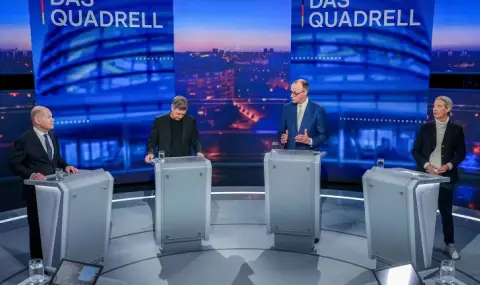Germans are voting today for the Bundestag (lower house of parliament), with a total of 29 parties competing for seats, BTA reported.
10 of them can be voted for throughout the Federal Republic, and the other 19 - in one or more federal states.
The federal elections in Germany were originally scheduled for September 28, 2025. The sudden collapse of Chancellor Olaf Scholz's triple coalition, which included the German Social Democratic Party (SPD), the "Greens" and the Free Democratic Party (FDP), however, forced early elections.
Sholz called a vote of confidence in the Bundestag and lost on December 16, which was expectedly rejected and Federal President Frank-Walter Steinmeier dissolved the Bundestag and scheduled new elections for the lower house of parliament.
According to data from the Federal Election Commission, around 59.2 million Germans eligible to vote will be able to vote in today's elections for the 21st Bundestag, including German voters living abroad.
Candidates for chancellor have been nominated by the five main political parties competing in the elections: the Christian Democratic Union (CDU) together with its Bavarian sister party the Christian Social Union (CSU); the SPD; the "Greens"; the far-right "Alternative for Germany" (AfG) and the relatively new populist "Sarah Wagenknecht Alliance" (ASV).
Many other parties are fighting for the voters' favor, but they will have to cross the five percent threshold to have deputies in the new parliament.
In 2023, the Bundestag adopted a new electoral law, which will be implemented for the first time today. The aim of the reform is to reduce the size of the parliament to the future fixed number of 630 seats.
The lower house of the German parliament officially has 598 seats. In national parliamentary elections, German citizens vote twice - once directly for a regional candidate and once for a party list.
With the first vote, voters determine which direct candidate will represent a particular constituency in the Bundestag - who will go to Berlin on their behalf. Whoever receives the most first-place votes in one of the 299 constituencies becomes a member of the Bundestag.
Voters vote a second time – for a given party. For example, if a party receives 20% of the second-place votes nationwide, it is entitled to 20% of the seats in the Bundestag.
This type of voting combines proportional and majority voting. For example, a voter may like a particular candidate from their own constituency and support him with their first vote, but with their second vote, the voter may support a party other than the one that nominated the candidate in question because they like its general election program.
Previous rules gave some parties additional seats in order to maintain the correct ratio between majority and proportional voting. In the last legislative period, the Bundestag increased to 735 seats.
However, after the reform came into force, a candidate may have won the direct vote in his constituency but not enter the Bundestag if his party did not receive enough votes in the second vote. In this way, the number of deputies will not exceed 630.
The burning questions surrounding the vote include how the parties from the previous ruling coalition will perform; will the Christian Democrats become the largest political force; will the "Left" to re-enter parliament and how many seats the far right will take.
Germany must play a stronger role in Europe and Europe must play a stronger role in the world, said today the leader of the German Christian Democratic Union (CDU), Friedrich Merz, during an event in Munich to close the election campaign of the CDU and its ally the Christian Social Union (CSU), reported the German television Zet DF, quoted by BTA.
"We must take care of our interests", said Merz. Anyone who "appears as a dwarf" to the United States, for example, will be "sent back home as a dwarf", Merz emphasized. Germany will only regain respect in the European Union if it improves its economic situation, he added.
The leader of the German conservatives explained that he intends to change the structure of the Federal Ministry for Economic Affairs and Climate Protection, which is currently headed by the Greens' candidate for chancellor Robert Habeck.
"There will be no combination of economy and climate in the next federal government," Merz said.
He stressed that strengthening the Bundeswehr and the German economy would be key goals if he were elected chancellor.
"They will only take us seriously if we have good defense capabilities," said the CDU/CSU candidate for chancellor.
On the last day before the general election, the parties and leading candidates continued to canvass voters who had not yet decided which party to vote for.
The CDU and CSU held the finale of their election campaign in the Bavarian capital Munich. Keynote speakers at the "Löwenbräukeller" center, where the event was held, were the candidate for chancellor and leader of the CDU Friedrich Merz, the leader of the CSU Markus Söder and the chairman of the CSU parliamentary group Alexander Dobrindt.
The German Social Democratic Party (SPD) closed its election campaign last night in Dortmund, while Chancellor Olaf Scholz met with citizens and SPD campaigners in Potsdam and Brandenburg.
